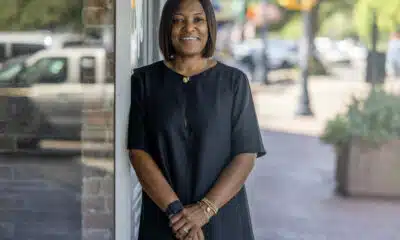Mississippi Today
Brett Favre says the welfare agency didn’t help satisfy his volleyball pledge, but Aaron Rodgers, Jimmy Buffett and others did
Brett Favre says the welfare agency didn’t help satisfy his volleyball pledge, but Aaron Rodgers, Jimmy Buffett and others did
NFL legend Brett Favre says Mississippi’s welfare department didn’t help satisfy his pledge to fund a new volleyball stadium at University of Southern Mississippi.
But current Green Bay Packers quarterback Aaron Rodgers, a charity started by Margaritaville-songwriter Jimmy Buffett, and former Gov. Phil Bryant’s political action committee did.
Favre has made national news in recent years for tapping his home state’s welfare agency to raise funds for the stadium, but an email Mississippi Today recently obtained shows he also raised at least $180,000 for the facility from at least four charities. These are organizations that claim to increase economic, educational or workforce opportunities for families in need.
One of the key allegations against Favre in Mississippi’s welfare scandal is that he personally benefited from a scheme to divert federal funds intended to help poor Mississippians to build a volleyball stadium at his alma mater.
Mississippi Department of Human Services, which is suing Favre and dozens of others to recoup the misspent funds, draws this conclusion because, they allege, Favre personally committed funds to the project, so any welfare money used to offset that obligation was a financial benefit to Favre.
The athlete, who also directly received $1.1 million in welfare funds, did personally agree to fundraise or donate just over $1.4 million, according to a never-before-published donor agreement introduced in court this month. The document was signed by Favre, his wife, and University of Southern Mississippi Athletic Foundation President Leigh Breal.
But this guarantee came months after Mississippi Department of Human Services and one of the agency’s subgrantees, nonprofit Mississippi Community Education Center, had already crafted a lease agreement allowing them to funnel $5 million in federal welfare funds to the project.
In Favre’s latest reply to MDHS in early April, his attorneys accuse MDHS of using legal fallacies in its civil charges against Favre.
“MDHS’s theory would effectively place no limits on UFTA (Uniform Voidable Transactions Act) liability—anyone could be sued who could in any way be deemed to have reaped some undefined benefit from a transfer,” Favre’s latest motion reads. “That of course is not the law in Mississippi or anywhere else.”
Since Mississippi Today first uncovered in February of 2020 that officials used welfare money to build the volleyball stadium, the entities involved have not made public a full accounting of who paid for the roughly $8 million facility, which would show who contributed to the project following Favre’s commitment so he didn’t personally have to.
An email recently obtained by Mississippi Today reveals publicly for the first time that, at least by the time initial arrests were made, the following individuals had made contributions towards Favre’s pledge:
- American Family Insurance Dreams Foundation Inc. (6/22/18): $100,000
- Imagine Mississippi Political Action Committee (6/4/18): $2,500
- Anonymous Donor (7/30/18): $150,000
- SFC Charitable Foundation (7/10/18): $33,378
- Brett Favre (8/16/18): $50,000
- Steel Dynamics Foundation (7/9/19): $25,000
- Aaron Rodgers (10/10/19): $10,000
- Howard Deneroff (1/7/20): $500
- Jimmy A. Payne Foundation (1/13/20): $22,000
- Matt Helms (1/24/20): $360,000
Favre attached this email to his most recent court filing, but redacted the donors’ names. Mississippi Today retrieved an unredacted copy, which University of Southern Mississippi should have produced to the news organization in response to a public records request last year, but did not.
The list does not implicate Rodgers, Buffett, or any other private donor in the welfare scheme. But the email serves as a key piece of evidence in Favre’s defense.
The gifts cited total just over $650,000. Documents reflecting the total amount Favre personally contributed towards the project have not been made public, but his lawyer Eric Herschmann told conservative sports podcaster Jason Whitlock in a February interview that Favre donated over a million dollars of his own money to the facility. Also, The Athletic first reported that from 2018 to 2020, the same years Favre had an obligation to fund the volleyball construction, his charity Favre 4 Hope donated nearly $133,000 to USM Athletic Foundation.
In addition to the $5 million in welfare funds that went towards the facility, Nancy New, founder of the nonprofit in charge of spending welfare funds, alleged that former Gov. Bryant directed her to make $1.1 million in payments to Favre to help Favre raise funds for the stadium — an allegation Bryant has denied to the press.
But a spokesperson for the athlete recently confirmed that Favre did not use that money on the facility.
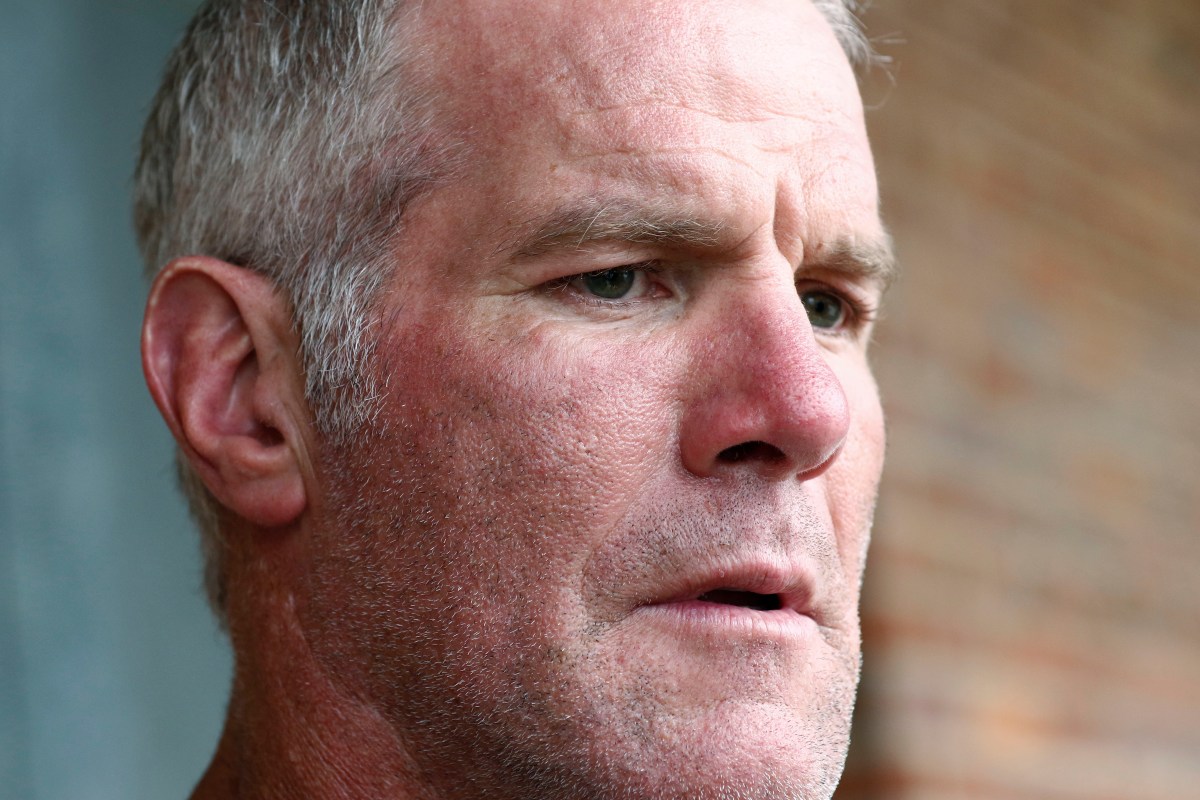
“Brett fulfilled his only obligation to USM. No funds he received from MCEC went towards the wellness center. Brett both solicited donations and often asked individuals or groups to send money to USM instead of paying him for services he provided,” a spokesperson for Favre said in a statement last week.
While a complete and reliable breakdown of the funds used to construct the facility has not been made public, outside counsel for the athletic foundation recently confirmed in an email requested by Favre’s wife Deanna Favre that the Favres “satisfied the obligations of their Donor Agreement by raising or paying the Foundation in excess of the pledged amount of at least $1,406,747.55 for the Volleyball Wellness Center.”
“This includes cash donations given directly by Brett and Deanna Favre and other amounts contributed at the request of Brett and Deanna Favre,” Ridgeland-based attorney Scott Jones wrote in the Mar. 23, 2023 email to Favre’s attorneys.
University of Southern Mississippi has refused to answer several questions from Mississippi Today about the volleyball project, citing litigation.
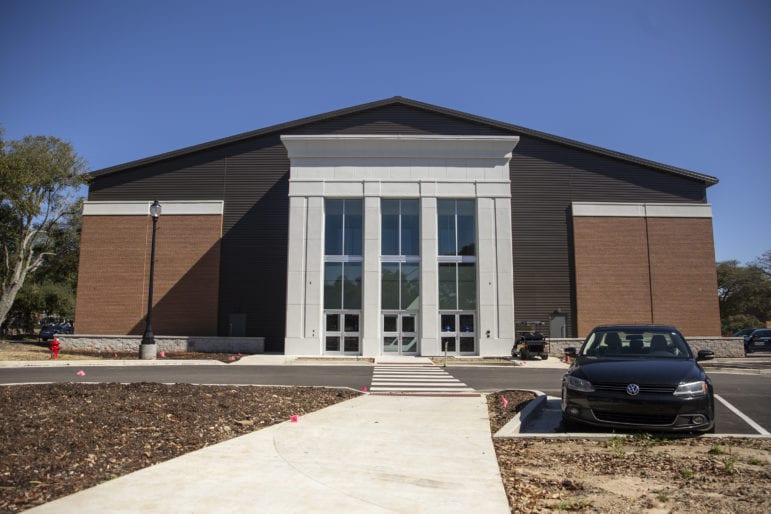
Favre began fundraising for the new volleyball stadium at USM, where his daughter played the sport, in 2017 – no one argues that. What’s in dispute, and belabored in lengthy court motions back and forth, is whether Favre promised to come up with the funding for construction at the outset of the project.
Favre argues in his motion to dismiss the civil suit against him that the $5 million paid in 2017 couldn’t have satisfied his $1.4 million guarantee in 2018 since the payment came before the pledge. MDHS alleges that Favre made a “handshake deal” near the inception in 2017, which is the only reason the university proceeded with the project, meaning he was on the hook for the funding the entire time.

By mid-2017, Favre had supposedly contributed $150,000 towards the volleyball project, according to an April 2017 email from Morrison to then-USM Athletic Director Jon Gilbert. After struggling to secure many more big donors, Gilbert involved nonprofit founder Nancy New, who had already entered at least one lease agreement with USM for the purpose of using grant money to make building renovations on campus – a purchase that has yet to be scrutinized.
“Brett and Deanna have agreed to help with fundraising for the facility,” Gilbert wrote in a July 16, 2017, email to New. “We currently have $1.2 million in hand from a variety of people that have committed to the project … I will find out what Brett’s schedule is Tuesday and coordinate a time he can stop by that works for everyone.”
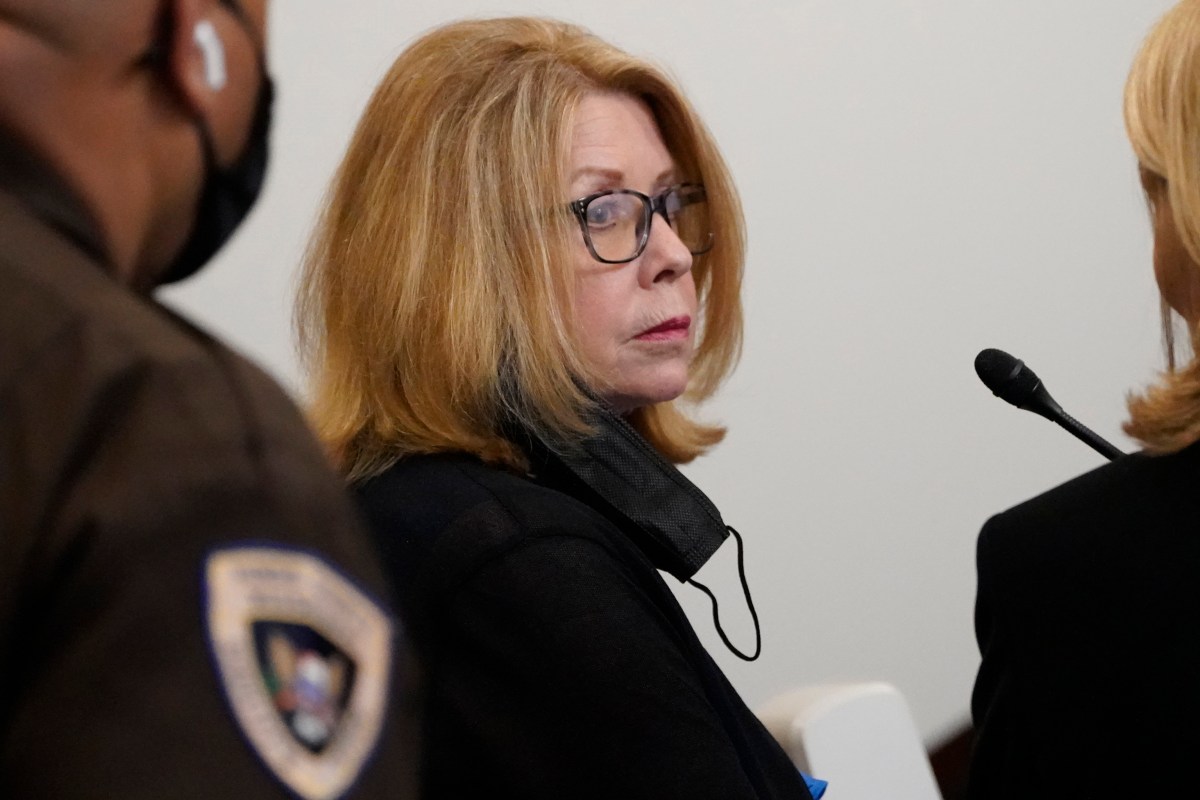
In the days and weeks following, Favre and New discussed by text the challenges in using federal grant funds for the volleyball stadium, since federal law prohibits spending of these dollars on brick-and-mortar construction projects. Favre suggested the nonprofit hire and pay him for marketing services – which are allowed under the federal rules – and that way he could pass the money to the athletic foundation.
“Will the public perception be that I became a spokesperson for various state funded shelters,schools,homes etc….. And was compensated with state money? Or can we keep this confidential,” Favre texted New in a never-before-published text first introduced into court last month.
New responded that only she, her son Zach New and former Mississippi Department of Human Services director John Davis would have information about the payment – a product of the secrecy shrouding the welfare program.
“So if we keep confidential where money came from as well as amount I think this is gonna work,” Favre wrote.
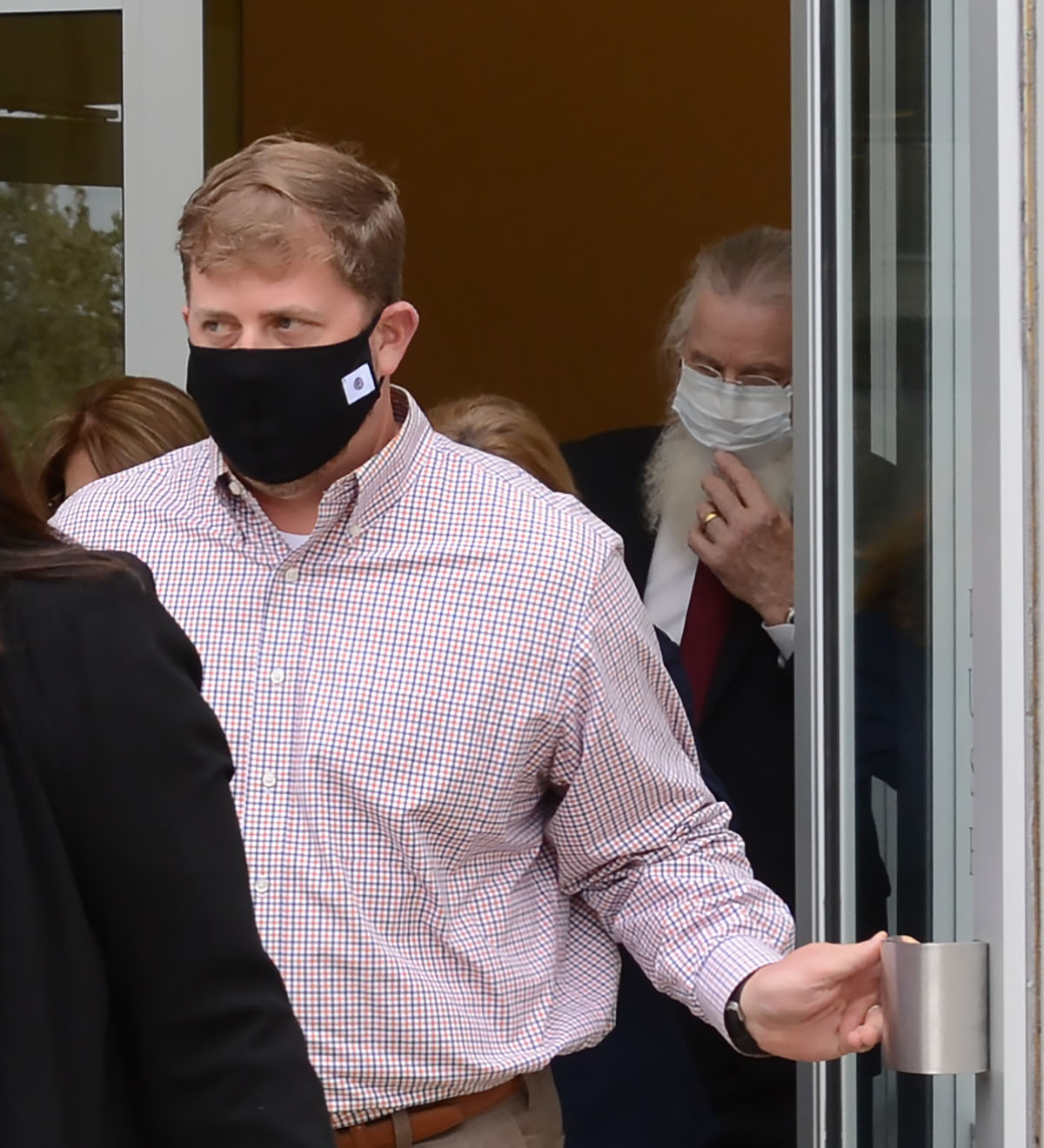
The nonprofit eventually made two $2.5 million payments through a lease agreement with USM Athletic Foundation in November and December of 2017. For this, Zach New pleaded guilty to state charges of defrauding the government. To make the lease appear legit, the nonprofit said it would occupy classrooms inside the stadium, where it would conduct programming for underprivileged people. Later that December, the nonprofit also made the first $500,000 payment directly to Favre under an agreement that he would cut a radio ad for their anti-poverty program.
In the following months, Favre learned that the construction bids had come in much higher than expected, and that USM Athletic Foundation wouldn’t be able to begin building the facility until they could guarantee more funding was coming.
In April of 2018, an email stated that Favre’s original gift of $500,000 towards the volleyball stadium would be reduced to $250,000 after he instructed the university to transfer half to the construction of a beach volleyball arena. (His daughter had moved from the indoor team to the beach team).
In order for work to begin, Favre signed the $1.4 million donor agreement, ensuring that he’d raise or cover the rest of the cost, on May 2, 2018.
About a week later on May 10, New texted Favre, “I am making some progress on our money needs. What amount out of the whole loan that you signed would be most helpful right now? John and I may have a plan!!”
This text appears to show that Favre and New had planned for the nonprofit to contribute towards his guarantee.
On May 17, New texted Favre, “Good news. I have a little money for the ‘project’ – $500,000! Do you want me to send to the Athletic Dept. Or to your foundation.”
New sent the payment in the following weeks to Favre’s for-profit company Favre Enterprises, Inc., according to the State Auditor’s Office.
The text suggests that they both understood the payment to Favre – paid under what was essentially a sponsorship agreement – was ultimately for the purpose of supporting construction at USM.
“While $1,100,000 was paid based on a contract for public appearances, and Favre did record a radio advertisement, the payment was intended, as requested by Bryant, to help Favre raise funds for construction of the Volleyball Facility,” reads New’s October filing in the civil case.
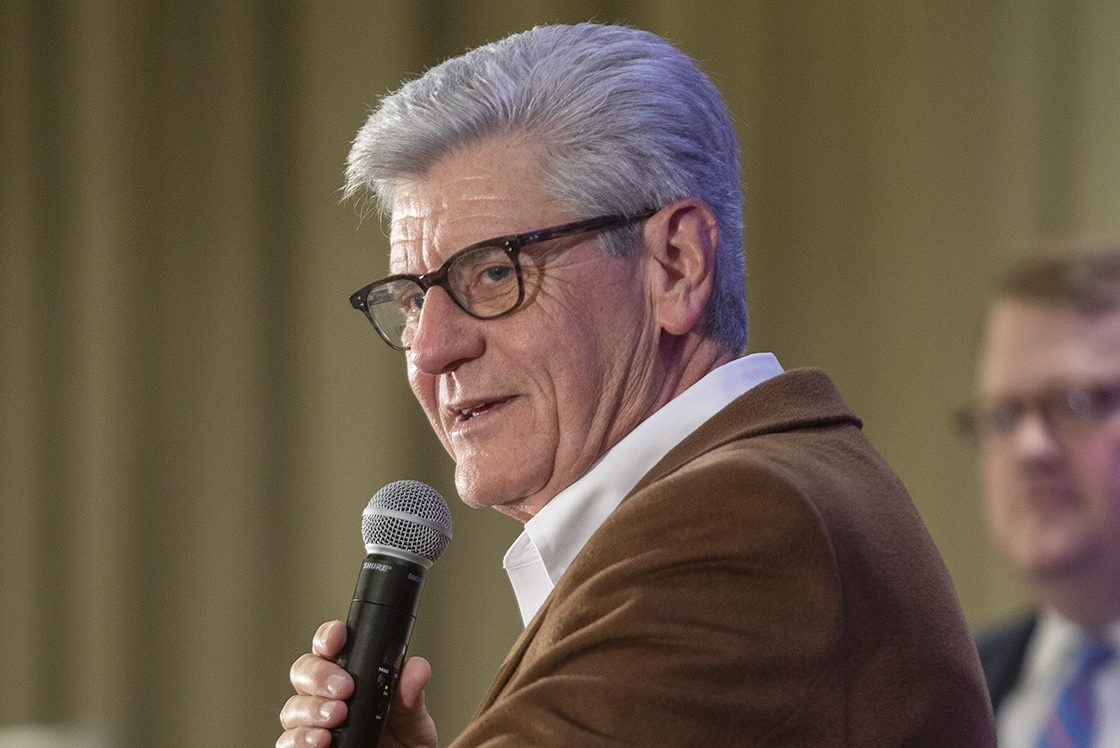
Through his counsel, Bryant has denied the allegation to Mississippi Today. At the point this payment was made, Favre had not yet cut the radio ad.
“Favre knew that this was a sham designed to allow MDHS to cover Favre’s commitment to fund construction of the volleyball facility,” MDHS alleges in its amended complaint.
Despite their plans, Favre didn’t use the money for the alleged purpose he received it, according to his spokesperson’s statement.
Also in June of 2018, Favre secured donations for the facility from American Family Insurance Dreams Foundation Inc. and Bryant’s PAC Imagine Mississippi Political Action Committee.
Bryant was still governor when Imagine Mississippi PAC donated $2,500 to the volleyball project in June of 2018. Bryant started the PAC by closing his campaign-finance account and transferring the bulk of the $1.05 million he had left over to the new organization in 2017 shortly after winning his second term. The PAC’s stated goal is to support conservative candidates and officials. It spent about $220,000 in 2017, $216,000 in 2018, $307,000 in 2019 and $23,000 in 2020. It did not file an annual report for 2021 or 2022 or a notice of termination, according to what is available on the Secretary of State’s Office website.
American Family Insurance Dreams Foundation Inc., which donated $100,000 towards the volleyball stadium, is a nonprofit focused on supporting programs in academic achievement, healthy youth development, economic opportunity, such as job training, and community resilience, including food, housing and daycare.
A spokesperson for the foundation told Mississippi Today that Favre played in its golf tournament for several years, drawing large crowds and helping fundraising efforts for its nonprofit partners. “For his participation, we made charitable contributions to a few select organizations of his choice, including the University of Southern Mississippi. Supporting colleges and universities, including programming that impacts students, aligns to the mission of the American Family Insurance Dreams Foundation.”
The spokesperson did not respond to follow up questions about what programming the foundation thought its gift was supporting.
In July of 2018, Singing For Change Charitable Foundation — a charity founded by Pascagoula-native and USM alum Jimmy Buffett with the slogan, “Turning good vibes into good deeds” — gave $33,378 for the facility. Its website says it gives grants to small, grassroots nonprofits across the country that help people “get back on their feet, back into homes, back to work, find meaningful jobs, become better educated, and thrive according to their definition.” One dollar for every concert ticket Buffett sells on tour goes towards his foundation.
“Our contribution on behalf of student wellness at USM was made in good faith to the University’s foundation,” a spokesperson for SFC Charitable Foundation said in a statement to Mississippi Today. “… When any nonprofit goes astray and mismanages funds, it’s a sad day for those of us in the sector but especially distressing and financially stressful for local organizations handling the fallout. As Jimmy’s tour resumes this spring, we will to continue to support people living on the margins across the U.S.”
An anonymous donor also contributed $150,000 towards the volleyball stadium that month, according to the Morrison email, and Favre himself donated $50,000 the next month.
Despite personally receiving $1.1 million from the nonprofit, Favre continued in the following months and years to lobby welfare officials, other government officials and current Gov. Tate Reeves in an attempt to secure more public funds to satisfy his obligation.
But this never happened: “Zero public funds went towards satisfying this voluntary pledge,” the spokesperson for Favre confirmed for the first time to Mississippi Today recently.
It’s unclear how Favre may have used the $1.1 million he received from MCEC, which he has since repaid to the state. When he spoke to his associates about his debt in the project, the number varied from $1.1 million or $1.2 million in March of 2019 to $1.8 million in September of 2019.
By July of 2019, Davis had been ousted for suspected fraud and Favre was becoming worried.
“Nancy has been awesome to me and has paid 4.5 million for a 7 million dollar facility. And she said it was all gonna be taken care of until this morning,” Favre wrote to his business associate, Jake Vanlandingham, founder of a pharmaceutical startup company called Prevacus, on July 16, 2019. This text was first published by Mississippi Today in its investigative series “The Backchannel.”
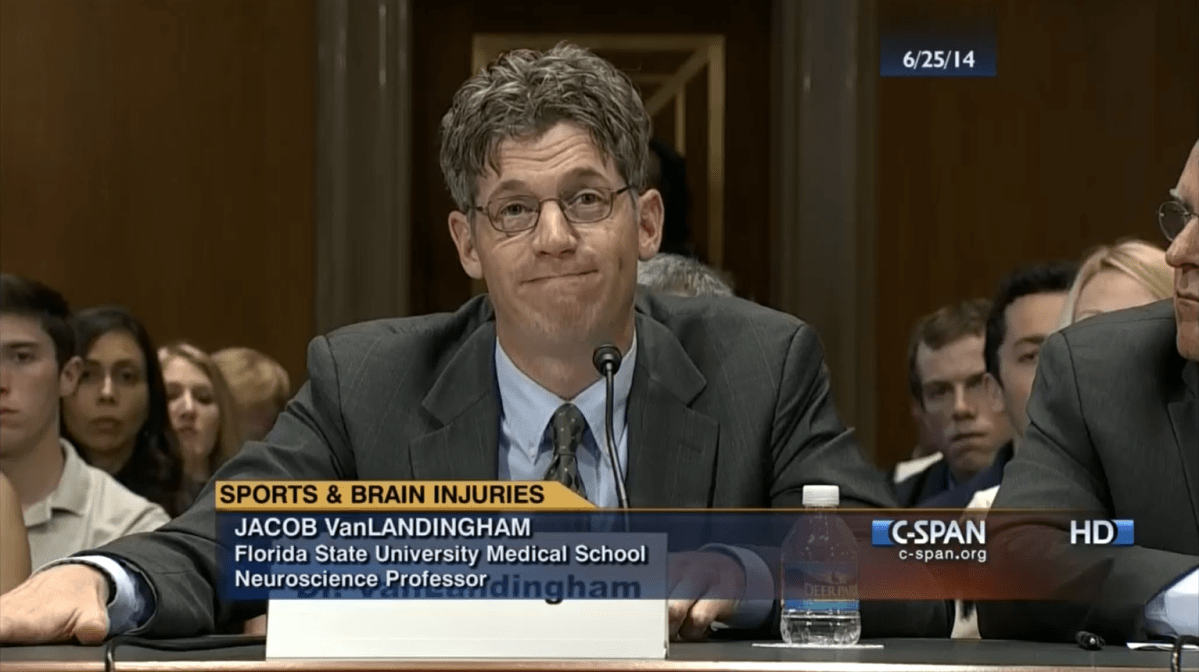
(MDHS also alleges that Favre participated in the funneling of $1.7 million in welfare money to Prevacus, to which New has pleaded guilty criminally, and that Favre is liable. In response, Favre’s attorneys argue, “All Favre is alleged to have done with respect to Prevacus is to have introduced VanLandingham to New … This is insufficient to state a claim that Favre agreed to join a conspiracy … if this conduct was sufficient to join a conspiracy, then MDHS could also add as co-conspirators Southern Miss Athletic Director Jon Gilbert for his role in introducing New to Favre and attending the meeting.”)
“Suddenly she said I don’t think I can do anymore,” Favre wrote to Vanlandingham, referring to New, according to “The Backchannel” texts. “So now I am looking at a big pay out.”
The same month, Steel Dynamics Foundation donated $25,000 towards Favre’s volleyball pledge. Steel Dynamics Foundation is the foundation associated with Steel Dynamics Inc., a Fort Wayne, Indiana-based company that has manufacturing sites in Mississippi and recently received $247 million in tax incentives from the state. The foundation’s website says its goal is to improve the quality of life and local economies in the communities where its employees work.
By September of 2019, Favre’s debt had apparently grown. “I have more shit going on not to mention a very likely 1.8 million note coming due that I thought was covered,” Favre texted Vanlandingham.
That month, Favre secured a meeting with Bryant and the new welfare director, Christopher Freeze, who replaced Davis. They discussed pushing additional grant funds to the volleyball project. After the meeting, Bryant encouraged Favre by text that “We are going to get there. … But we have to follow the law.”
Freeze told Mississippi Today he rejected the proposal and there’s been no evidence that any additional welfare money went to the project after this point.
The next month, Aaron Rodgers – the quarterback who replaced Favre at the Green Bay Packers, prompting a memorable feud in sports pop culture history – donated $10,000 to the facility, according to the Morrison email. Favre had also talked to Vanlandingham in 2019 about asking for Rodgers’ support with the pharmaceutical venture. Rodgers’ agent did not return emails or a call from Mississippi Today.
By early 2020, Favre was desperately trying to come up with the rest of the funding. According to the Morrison email, he then secured $500 from Howard Deneroff, executive producer of Westwood One Sports, an NFL broadcaster. Favre had asked Deneroff to donate in exchange for a sit-down interview on the network. Favre also collected $22,000 from the Jimmy A. Payne Foundation, the foundation of a USM alum and businessman, and $350,000 from Matt Helms, owner of a sports memorabilia store in south Mississippi.
But it wasn’t enough. Favre even attempted to involve the Mississippi Community College Board, incoming Gov. Tate Reeves and the Legislature.
Bryant texted then-USM President Rodney Bennett about Favre’s insistence.
“The bottom line is he personally guaranteed the project, and on his word and handshake we proceeded,” Bennett texted Bryant on Jan. 27, 2020, shortly after the outgoing governor left office. “It’s time for him to pay up – it really is just that simple.”
MDHS uses this text to substantiate its allegation that Favre committed the funds before the welfare payment, since the athletic foundation proceeded with the project by hiring architects to start drafting renderings of the building in July of 2017.
All of this together, MDHS alleges, “support the reasonable inference that Favre personally committed to guarantee the volleyball facility’s construction at the outset of the project.”
Favre’s attorneys push back: “MDHS takes this text message completely out of context—it clearly related to efforts by Favre to raise funds to meet his 2018 written commitment,” Favre’s recent reply states. “MDHS takes a giant and unsupported leap of faith in claiming that the text message related to some different, earlier commitment.”
On the day of the initial arrests in February of 2020, Morrison, the associate athletic director, sent Favre the email describing “the following gifts that have been applied towards your commitment to the Volleyball Facility.”
Asked about the timing of the email, the Favre spokesperson said, “it is purely coincidental.”
The indictment, which was made public that day, had named Prevacus and its affiliate PreSolMD, alleging that the News had embezzled welfare funds from their nonprofit to invest in the companies.
About a week later, Vanlandingham texted Favre, saying he wasn’t sure if one of their potential investors was going to follow through with his contribution “given this MS embezzlement shit.”
Vanlandingham asked the athlete to make another $50,000 donation so PreSolMD could begin developing what it called a “pregame cream” that it promised could prevent concussions.
“…I would but up to my eyeballs in vball debt,” Favre responded.
This article first appeared on Mississippi Today and is republished here under a Creative Commons license.
Mississippi Today
This superintendent took a failing Delta school district to a ‘B’ rating. Now, she’s leaving
INDIANOLA — The top of the Jeep was down, and Miskia Davis was behind the wheel, leading a parade through downtown Indianola.
It was 2019, just two years after the now 50-year-old Davis became superintendent of Sunflower County Consolidated School District. Back then, she wasn’t sure this moment would ever come.
She recalled feeling the first cool breeze of October as she waved at people who lined the street, smiling and celebrating.
But it had — the district’s first “C” rating, its first passing grade, and the community had shown up to a parade to celebrate the achievement. Generations of teachers and Sunflower County graduates stood on the sidewalk, proudly cheering the assembly of cars and students.
“It was … Oh my God,” Davis said. “My children were like, ‘We did something.’”
The work hadn’t been easy, but it had been worth it, Davis thought — the number crunching, the doubt and lukewarm welcome she felt from the community, the tough decisions she’d had to make.
Now, she’s ready to move on.
Daughter of the Delta
From starting kindergarten to subbing for elementary classes, Davis’ childhood and career in Sunflower County and her identity as a daughter of the Delta were her strengths in the classroom, she said.
“I grew up in Drew, poor and with two young parents,” Davis said. “We didn’t have elaborate meals, and when I went home, the lights may have been off. But it made me who I am, and these children were experiencing the same things I experienced as a child.”
So Davis was relatable. But as a young high school teacher at Ruleville Central High School, some of her students looked older than her and many were taller than she was. She was forced to learn how to command respect, too.
One particular child taught her an invaluable lesson. He was a star football player in her biology class, and he was failing the course by two points. He caused trouble in class and Davis was determined to fail him, despite more experienced teachers prodding her not to, to look past her own ego.
So Davis gave him another chance. She had him do extra work and spent hours talking to him. She learned why he behaved poorly in class — he was one of seven children to a young, single mother.
“He was angry at the world, and I just happened to be in the world,” she said. “It taught me the power of relationships. I think that’s the most important catalyst in transforming education.”
It was during that time that her superintendent “saw something” in her and pushed her to become a school leader. That kickstarted her journey in administration.

Davis soon learned she had a particular gift for turning failing schools around. Under her leadership as principal, Ruleville Middle School went from failing to an “A” letter grade in three years.
Her school improvement strategy began to take shape, similar to her teaching style. Davis was both a disciplinarian and someone to whom teachers and students could relate. She prioritized building strong relationships with teachers who were invested in their students. But she didn’t shy away from making controversial decisions, either. In Ruleville, she fired nearly all of the staff when she arrived.
But as Davis was gaining her footing as an administrator, Sunflower County School District was struggling.
After consistent failing grades resulted in the state takeovers of Indianola, Sunflower and Drew school districts, the Legislature decided to consolidate the three systems in 2012.
District consolidation is a massive undertaking for any community, but especially for Sunflower County — smack dab in the middle of the Delta, an under-resourced region with a shrinking population, high poverty rates and a deep history of racial exploitation.
Davis arrived in 2014 to a school district that had lost hope — a district that she didn’t recognize.
All Sunflower knew was ‘failure’
Davis never wanted to be superintendent.
She spent three years working under the leader of the consolidated district. But when the superintendent was dismissed in 2017, Davis was appointed to the head role in an interim capacity. She got the job in January of 2018 without ever applying.
So with another state takeover looming, Davis went to work. The biggest challenge? The district and the community seemed resigned to failure.
“We had been failing so long, that’s all we knew,” she said. “No one was even sad.”
Early on, Davis visited a school to discuss recent test results. She was so struck by teachers’ apathy that she stopped the meeting midway and had them tear off a scrap of paper and write “yes” or “no” to a question: Did the teachers believe their school could ever be successful?
More than half said no.
“They were teaching my children,” Davis said, tearing up. “And they didn’t think they would ever be successful.”
Davis went to the school board to tell members that she wouldn’t be renewing many of those teachers’ contracts. That’s when she realized she didn’t just need to boost test scores — she needed to change attitudes.

The hashtag #WINNING was born.
“We started to celebrate every little accomplishment,” Davis said. “We got T-shirts, shades, whatever. That was our mantra.”
Children received certificates for a week of perfect attendance. When students did well on benchmark assessments, teachers were ushered into the hallway to be celebrated by students and colleagues. Davis created the “Killin’ It” awards, given to students and teachers for meeting their testing benchmarks.
They were just certificates, at the end of the day. But it led to a changed school culture, a renewed belief that they could succeed.
As an administrator, Davis leaned on what she knew worked as a teacher, relationship-building and strong discipline (she even sent her nephew to alternative school for fighting), and combined it with a data-driven approach and an eagle-eyed focus on testing.
She put an academic coach in every building, whose sole responsibility was supporting teachers.
Davis took teacher Dylan Jones out of the classroom and put him in the central office, where he was tasked with tracking district metrics.
Jones uncovered which consultants were working and which were uselessly costing the district millions. The district went from contracting with 30 firms to just four.
Jones also created an accountability system for teachers. With one click, Davis could see how each teacher’s students were performing, and she gave everyone access to the data. If teachers weren’t meeting their goals, Davis hosted regular meetings and had them explain — in front of everyone — what they needed to succeed.
Davis’ methods weren’t popular at first. Educators went to the school board and complained that the system was “punitive.” Some even quit. But Davis was steadfast and implored board members to see the work she and her team could do, if given the chance.
The district’s rating didn’t budge in 2018.
But in fall 2019, after Davis’ first full year as superintendent, Sunflower County Consolidated School District had earned its first “C” rating.
What happened after the first ‘C’
Those early years were difficult, Davis remembered, because she felt so isolated, just her and her team “in the trenches.”
She hosted community meetings, imploring local parents, leaders and business owners to support the district.
“They told me to come back when we were no longer failing,” Davis said.
So after that first “C,” when she started seeing the district’s hashtags on Facebook, when more people started coming to school events, when she started to get invited to speak at the local Rotary Club, it was bittersweet.
Teachers, too, took a while to come around. Their performance was being closely monitored through the accountability system, but soon they realized that Davis wasn’t giving them mandates outside of improving test scores. She gave them autonomy in their classrooms. Teachers had the final say on how to improve their students’ achievement. That kind of trust isn’t common, Sunflower County teachers told Mississippi Today.
It wasn’t until 2021, when voters passed a $31 million bond issue that would pay for major school renovations, that Davis felt the full support of the community.
Davis even won over Betty Petty, a local matriarch and fierce advocate for kids and parents.
“She has actually shown a presence at the schools, constantly meeting with teachers and making sure all children are learning,” Petty said. “We had community meetings where she would actually come out and listen to our concerns.”
Petty attended the ribbon-cutting ceremony at Gentry High School last July. Before renovations, plumbing problems caused flooding when it rained, so students had to wade through water to get from class to class. Davis said she’d never forget the sight of generations of Gentry graduates in the school atrium, looking around in wonder at the new facility.
“At first, I chose the community,” Davis said. “But eventually, the community chose me.”

The legacy she leaves behind
Strong schools make strong communities, but it can take time for results to show. Indianola Mayor Ken Featherstone hopes to see the dividends soon.
Featherstone took office four years ago, around the same time the district got its first “B” grade. It has maintained the grade ever since, the highest in the entire region.
He, like Davis, was reared in the Delta, but empathizes with her struggle garnering the support of a community deeply impacted by gun violence and low investment from state officials.

“People are very result-oriented,” he said, leaning back at his desk in city hall. “You till the soil, but it’s not until you start your seed breaking the ground do you see other people starting to water it. That’s just human nature.”
He’s hoping the district’s academic gains will be a boon for Indianola’s struggling economy.
“We’re seeing things slowly come to our area,” Featherstone said. “To get manufacturing jobs to come to our area, we have to improve our public school system. Directors and presidents of manufacturing plants … they need to know where their kids are going to attend school.”
Davis announced in October 2024 that she would be leaving the superintendent job at the end of the school year. Now, she travels the state, consulting with other districts on how to replicate what she did in Indianola, as a director of District and School Performance and Accountability for The Kirkland Group, an education consulting firm based in Ridgeland.
Her departure was a tough blow, Featherstone said, and leaves the district’s hard-fought success hanging in balance.
Petty and her network of parents are concerned, too.
“I don’t think any of us know what will happen moving forward,” she said.
Davis said there was no big epiphany. She just felt her mission was accomplished. She said she’s adamant that the district’s “best days are ahead,” under new superintendent James Johnson-Waldington.
Johnson-Waldington, who was most recently serving as superintendent of Greenwood Leflore Consolidated School District, is also Sunflower-grown, and he was Davis’ principal when she taught at Ruleville Central High School. He plans on employing strategies similar to Davis: holding teachers accountable and celebrating their achievements.
After all, if it’s working, why change it?
“I feel a good kind of pressure,” Johnson-Waldington said. “I like challenges, and this is a new challenge for me. I’m not taking a failing school district to success. This is about maintaining and growing, and I accept that challenge for the very reason that this is home. I’m going to work very hard to maintain what Miskia has done.”
Davis leaves behind a legacy, Featherstone said, that makes her hometown proud. He was in the crowd that day at the parade. He remembers the excitement, the pride.
“Older teachers were there, and you could see the look on their faces that they knew they had reared someone who threw the oar out to a sinking district and brought it back up,” he said.
“She made us see ourselves in a better light, and we can’t thank her enough.”
This article first appeared on Mississippi Today and is republished here under a Creative Commons Attribution-NoDerivatives 4.0 International License.
The post This superintendent took a failing Delta school district to a ‘B’ rating. Now, she’s leaving appeared first on mississippitoday.org
Note: The following A.I. based commentary is not part of the original article, reproduced above, but is offered in the hopes that it will promote greater media literacy and critical thinking, by making any potential bias more visible to the reader –Staff Editor.
Political Bias Rating: Center-Left
This article presents a positive and detailed profile of an educational leader working to improve a struggling school district in a historically under-resourced and economically challenged region. The focus on community uplift, education reform, accountability, and addressing systemic challenges aligns with themes often emphasized by center-left perspectives. However, the article maintains a largely neutral and factual tone without overt political framing or partisan language, emphasizing pragmatic solutions and community collaboration rather than ideological positions.
Mississippi Today
Theology student’s ‘brain drains back home’ despite economics, safety concerns
Editor’s note: This Mississippi Today Ideas essay is published as part of our Brain Drain project, which seeks answers to why Mississippians move out of state. To read more about the project, click here.
Though I imagine I’ll never return, more often than not, my brain drains back to Mississippi. My whole adult life has been a journey up and down the Hudson River, from New York City to the Adirondacks, but inevitably, I find my thoughts leaking toward another river.
I grew up fearing being left behind in the Rapture, but in earnest, it feels like I’m the one who left everyone behind. I’m not proud of this, but I’m certainly not ashamed. I have roots in the Northeast now, and a life that isn’t easily transplanted elsewhere, especially to the Red Clay Hills of Neshoba County. Life took me from Mississippi, and life keeps me away.
I left Mississippi for New York in 2015, and I estimate that I’ve returned only 11 times. My sporadic trips home have been mostly because I’m consistently broke, but now it’s a combination of that and concerns for my safety.
My mother, also limited by finances and Mississippi’s minimum wage, has visited me twice in 10 years, once in the spring of 2016 and then when I graduated from Yale Divinity School in 2023.
I haven’t been back since I came out as a trans woman and began medically transitioning in the winter of 2024. I try not to be overwhelmed with guilt or grief for the imagined, shared life I don’t experience with my mother. Rather, I’ve learned to cherish what we do have.
It’s strange to be who I am, mostly for her but also for me. She has learned to love me regardless of whether or not she understands what I’m doing. In her mind, if you go to college, you become a nurse or a lawyer. You settle down, probably in Jackson, maybe Oxford, most likely in my hometown of Philadelphia, and commute by car more than an hour to work. You probably see your mom weekly. She sees her grandkids as often as possible.
That is not how life turned out. We do talk on the phone. Sometimes we get into once-a-week phone call sprees, other times, I drop off for weeks, maybe a month, when I’m depressed.
When I come home, she picks me up from the airport and drives me back a few weeks later. We crack the windows, smoke cheap Mississippi cigarettes and try to cram 10 years of a strange-to-us mother-daughter relationship into a 90-minute ride to the airport in Jackson. Usually, we talk about suffering, death, sin, God, the end of the world, and what the hell I am doing with my life.
You go to college to get a job, to make more money than your parents and to buy a strange suburban-but-rural McMansion just beyond city limits where you start a family around the age of 25 at the latest.
According to my mother, I went to the University of Mississippi and got brainwashed. She tells me often that it’s like she doesn’t know who I am, and she’s mostly right. She hasn’t met anyone I’ve dated in person since high school. She hasn’t seen me in person since transitioning, and I changed my name to Romy. I explain my relationship with my family to friends, peers, new partners and congregations, always with an articulate sense of heartbreak that I’ve learned to intellectualize and package up in a story of “working-class origins,” single motherhood, a white Christian nationalist rural community and my stumbling through adulthood “refusing not to live by my values.”
I originally left Mississippi to be an AmeriCorps Vista volunteer in the Capital Region of New York. I’d never been there. I took a Greyhound from Memphis to New York City to Albany, New York with two large suitcases and a backpack. Several of my friends from college had moved to New York City, and their couches and shared beds provided a safe launching pad for more of us. I had also fallen in love with a fashion student turned designer that I met on a trip to the city the year prior. Though that romance flamed and flickered for many years and ultimately flamed out, my reason for staying in the North was the life I was increasingly stumbling into.
I went there because, at the time, I had an insatiable desire to live out my values and politics. After all, I was maybe one of two socialist public policy majors at the Trent Lott Leadership Institute at the University of Mississippi, and I didn’t want to be a lawyer, a lobbyist or a policy wonk.
I wanted to be poor and engage in building sustainable autonomous communities. I wanted to learn how to be a person who had no work/life distinction, but a vocation and calling.
Through AmeriCorps, I luckily found a small group of activists, urban homestead types, organizers and ex-social workers living together helping others at the margins and themselves start businesses and worker-cooperatives while struggling through mental health crises, and taking on an impossible but seemingly always plausible dream of a directly democratic community owned, operated and governed only by those who live there.
This was my first “job” out of college. It was my dream come true, and the most difficult thing I’d ever done. I burnt out pretty hard after two years, and probably made somewhere between $25,000 and $30,000 during that whole time. Since then, the most I’ve made in a year is my current PhD stipend of about $34,000.
I was, however, helped along by friends, colleagues and the activist communities that I was stumbling into. Through them, I was encouraged to go to Union Theological Seminary, land a job at a prestigious artist residency in the mountains, go to Yale Divinity School, discern that I was called to be a priest and come to know myself as a trans woman.
My life outside of Mississippi has been sustained solely by relationships that transgress the boundaries between work and life, co-workers and friends. I regularly reflect on and often worry about how fragile this all is, and if my own vocational and intellectual pursuits have been worth what I’ve left behind or never had.
I’m not sure I’ll ever know. However, I’ve managed to find profound meaning in it all so far, and it keeps me digging myself into this hole in which I will hopefully find what I am looking for, or dig my own damn grave.
Originally from Philadelphia, Romy Felder (she/her) is currently a PhD student at Union Theological Seminary. She is also pursuing the priesthood in the Episcopal Diocese of New York. She has a background in worker-cooperative development, community organizing, popular education and arts management. Romy lives cavalierly but contentedly in Brooklyn, New York.
This article first appeared on Mississippi Today and is republished here under a Creative Commons Attribution-NoDerivatives 4.0 International License.
The post Theology student's 'brain drains back home' despite economics, safety concerns appeared first on mississippitoday.org
Note: The following A.I. based commentary is not part of the original article, reproduced above, but is offered in the hopes that it will promote greater media literacy and critical thinking, by making any potential bias more visible to the reader –Staff Editor.
Political Bias Rating: Left-Leaning
This essay reflects a distinctly personal and ideological perspective rather than neutral reporting. The author frames Mississippi as economically limiting and socially unsafe, particularly for marginalized identities such as transgender individuals, while presenting Northern activist and academic communities in a sympathetic and aspirational light. References to socialism, worker-cooperatives, and critiques of conservative Mississippi culture suggest a worldview aligned with progressive or left-leaning politics. The tone is introspective and critical of traditional Southern expectations, while valorizing alternative, activist-driven lifestyles. As such, the piece is less about balanced reporting and more an expression of lived experience through a progressive lens.
Mississippi Today
‘Get a life,’ Sen. Roger Wicker says of constituents
A note from Adam Ganucheau: A couple hours after this column published, Sen. Roger Wicker’s office reached out and demanded a correction, saying the senator’s “get a life” comment was directed to himself and not to constituents. That’s certainly not how I nor hundreds of Mississippians who commented on and shared the viral video heard it. Mississippi Today has updated portions of this column to reflect concerns raised by Wicker’s office. Here’s a link to the video/audio of his response to the question about constituent concerns. Mississippians can decide for themselves what Wicker meant.
When 34-year-old Thad Cochran arrived in Washington after his first election in 1972, the Republican felt it important to document what he’d heard and learned from Mississippians on the campaign trail and share it with his young staff.
He sat down at a typewriter and wrote a memo titled “General Responsiveness” and dated March 14, 1973:
During the campaign I detected a very strong animosity among the people toward government and those associated with government bureaus and agencies. This included elected officials and those associated with them. Part of the cause of this attitude was due to a lack of feeling or understanding by government people for the needs and opinions of the average citizen. We are all in a job to represent all our constituents. We are not the bureaucracy. A constituent who asks us for help should be assured to be in need of help with our office as his last resort. A constituent who writes a letter should be made to feel by our response that he is glad he wrote us. A constituent who claims to have been wronged by the government should be assumed to be correct. Everyone should guard against developing the attitude that we are better than, smarter than or more important than any constituent. We do not hold a position of authority over any constituent. We are truly servants of the people who selected us for this job.
Every year from 1973 through 2018, over his three U.S. House terms and six U.S. Senate terms, Cochran shared that memo with every staffer who worked in his offices. The guidance, he said all those years, was a necessary reminder to show respect to the people who offer feedback or need help. He never wanted his staff or himself to forget who sent them to Washington.
The memo, like so many other things, serves as a stark reminder that Cochran was among the last in a bygone era of American politics. The perspective he wrote and shared is a far cry from what Mississippians have been getting recently from our current U.S. senators.
“Surely everybody else has better things to do with their time,” senior U.S. Sen. Roger Wicker said to a room full of constituents earlier this month when asked about calls and emails his office has been getting. After half-heartedly explaining that he does see a list of names of people who reach out to his office, he quipped: “Get a life.”
Wicker’s office said Friday that the senator directed “Get a life” to himself, not to constituents.
Wicker, who typically chooses his words a little more carefully, perhaps has been trying to match his junior colleague’s energy.
“Why is everyone’s head exploding?” U.S. Sen. Cindy Hyde-Smith said in April to Mississippi constituents who had expressed concerns over slashing federal Medicaid spending. “I can’t understand why everyone’s head is exploding.”
There are many kind staffers working for Republicans Wicker and Hyde-Smith who are helpful to Mississippi constituents in any number of ways privately or behind the scenes. These people care deeply about serving their home state and they do it well, and they cannot help how their bosses address the public. But, boy, their phones must be blowing up more than ever since the senators made these comments.
Consider, for a moment, what it means that we have devolved from having a leader who believed that “a constituent who claims to have been wronged by the government should be assumed to be correct” to one who thinks telling constituents to “get a life” is appropriate. Think about the fact that we replaced a leader who regularly reminded his staff that “we are truly servants of the people who selected us for this job” with one whose gut response to legitimate concerns from constituents is that their “heads are exploding.”
Just … wow. To call it alarming doesn’t fully encapsulate the gravity of their behavior. It’s enough to discourage even the most optimistic among us about the present and future of our state and our nation.
It’s enough to inspire you to ponder, in this intense political climate when unprecedented and harrowing federal government decisions are being made and going largely unchecked every day, whether our current U.S. senators even remember why they’re in Washington, why we sent them there.
It is necessary, in the shortest possible order, to ask and answer for ourselves what we should expect of our elected officials and whether we should feel OK about being dismissed or ignored outright like this.
You don’t have to be a Democrat to think that this behavior is out of line. Plenty of Republicans — some publicly and many privately — are increasingly disturbed by what’s happening in Washington. Regardless of your own personal political beliefs, be honest with yourself about whether you can read these comments from our senators and still feel that your best interests are being represented.
Sadly, we can no longer ask Cochran to help us answer these questions, but it sure seems clear where he’d stand. What about you?
READ MORE: Mississippi, where ‘We Dissent’ means nothing to elected officials
This article first appeared on Mississippi Today and is republished here under a Creative Commons Attribution-NoDerivatives 4.0 International License.
The post 'Get a life,' Sen. Roger Wicker says of constituents appeared first on mississippitoday.org
Note: The following A.I. based commentary is not part of the original article, reproduced above, but is offered in the hopes that it will promote greater media literacy and critical thinking, by making any potential bias more visible to the reader –Staff Editor.
Political Bias Rating: Center-Left
The content critiques Republican senators for their dismissive attitude toward constituents, contrasting them with a more respectful past leader. It highlights concerns about current political behavior and governance, emphasizing accountability and responsiveness to the public. While it acknowledges that some Republicans privately share these concerns, the tone and framing suggest a leaning that favors more progressive or reform-minded perspectives, typical of center-left commentary.
-
News from the South - Texas News Feed3 days ago
New Texas laws go into effect as school year starts
-
News from the South - Texas News Feed6 days ago
Kratom poisoning calls climb in Texas
-
News from the South - Tennessee News Feed6 days ago
GRAPHIC VIDEO WARNING: Man shot several times at point-blank range outside Memphis convenience store
-
News from the South - Florida News Feed3 days ago
Floridians lose tens of millions to romance scams
-
News from the South - Kentucky News Feed6 days ago
Unsealed warrant reveals IRS claims of millions in unreported sales at Central Kentucky restaurants
-
News from the South - Kentucky News Feed6 days ago
Woman charged in 2024 drowning death of Logan County toddler appears in court
-
Mississippi Today6 days ago
‘Get a life,’ Sen. Roger Wicker says of constituents
-
News from the South - West Virginia News Feed6 days ago
Man sentenced to home confinement for deadly DUI crash











